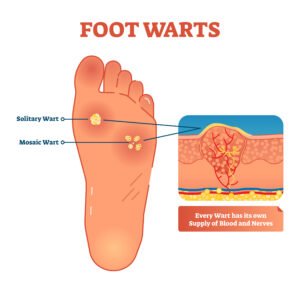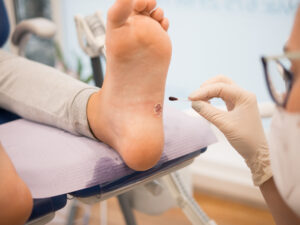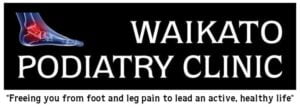Warts – Let Us Help You!
Oral Zinc for the Treatment of Warts 
Plantar warts can be a persistent challenge for both patients and clinicians. Recently, oral zinc supplementation has been suggested as a beneficial adjunct to conventional wart treatments.
The first study exploring the effectiveness of oral zinc for wart treatment was published in 2002 in the British Journal of Dermatology (BJD). The study involved 80 participants, all of whom had plane, common, or plantar warts. Half of the participants were given oral zinc supplements, while the other half received a placebo (glucose pill). The results were compelling: 86% of those in the zinc group experienced complete wart clearance, whereas none of the placebo group saw any improvement.
Understanding Zinc and Its Role in Wart Clearance
Zinc is an essential trace element, with the average human body containing approximately 2–4 grams. Only about 5% of this is found in the skin, while the majority resides in muscles and bones. Zinc is ingested through the diet, absorbed in the intestines, and regulated by the kidneys. The recommended daily intake of zinc is around 10 mg for men and 7 mg for women. However, studies estimate that nearly one-third of the global population is zinc deficient.
Zinc plays a vital role in immune system function, including the activation of cytotoxic T lymphocytes, which are crucial for fighting infections, including the Human Papillomavirus (HPV), the virus responsible for warts. A deficiency in zinc can impair immune response, potentially making it more difficult for the body to clear warts naturally.
Are There Side Effects of Taking Zinc for Warts?
While zinc supplementation appears to be a promising wart treatment, it is not without potential side effects. The most commonly reported issues are gastrointestinal, including nausea, vomiting, and stomach pain. However, these effects are typically mild and manageable. Given the potential benefits, trying a zinc supplement may be a simple and effective way to support wart clearance, with relatively minimal risk.
How Do Warts Spread in the Home?
Warts are caused by the Human Papillomavirus (HPV), which accounts for approximately 86% of wart cases. However, little is known about the precise mechanisms of transmission within households.
HPV-1 is the most common subtype of the virus found in younger patients, particularly those under the age of 10. Interestingly, studies have shown that nearly 46% of people with warts—and 43% of their family members—carry HPV on their foreheads, suggesting that skin-to-skin contact plays a role in transmission.
Additionally, HPV can survive for about a week on hard surfaces, making proper hygiene essential. Cleaning commonly shared household items, such as bathmats and towels, may help reduce the spread of the virus. However, HPV is only fully eliminated at temperatures of 100°C, which means thorough boiling or high-temperature washing may be necessary for disinfection.
Are Warts Seasonal?
Some skin conditions, such as psoriasis, fluctuate with the seasons, often worsening in colder months. The question remains: do warts follow a seasonal pattern as well?
A study published by the American Academy of Dermatology examined search trends for different types of warts, including common warts, genital warts, and molluscum contagiosum (MC). The data revealed that while genital warts showed no clear seasonal variation, common warts and MC displayed a distinct seasonal pattern. The research indicated two peak periods for wart-related searches annually, suggesting a potential link between environmental factors—such as temperature changes and UV exposure—and wart prevalence.

Podiatrist treating a wart verrucas plantar on a patient's foot, no faces shown
However, it is important to interpret these findings with caution. The data was sourced from Google searches, meaning it reflects public interest rather than actual wart occurrence. Individuals may search for wart treatments months after developing symptoms, leading to potential discrepancies in the study’s conclusions. Additionally, wart persistence varies from person to person, with some warts lingering for up to a year before treatment is sought.
Interestingly, the seasonal trend was observed in some countries, including the UK, USA, Japan, and Canada, but not in others, such as Romania, Kenya, South Africa, and Brazil. This suggests that climate and lifestyle factors may influence wart prevalence in different regions.
Oral zinc supplementation shows promise as a complementary treatment for plantar warts, particularly for those who may have an underlying zinc deficiency. While more research is needed to fully understand the role of seasonality in wart outbreaks, maintaining proper hygiene and boosting immune health remain key factors in managing and preventing warts.
If you're struggling with persistent warts, consulting a podiatrist can help determine the best course of treatment for you.
Suffering from Warts?
Are you are feeling like you have tried everything but are still suffering from warts?
Do you feel like you have seen every health practitioner you can about your warts with no results?
We have a track record of diagnosing and successfully treating cases that have previously proven difficult to resolve and we’d love to help you get the problem sorted.


Hi there! My daughter is suffering from facial warts. She has a huge one on her nose and it’s been there for about 11 months now. She gets bullied a lot at school because of it and I don’t know what to do anymore, I take her to the doctors and the last time I took her they told me to buy over the counter wart treatment but it does nothing, if anything it grows bigger! I really need help
Hi there Rawinia, sorry to hear this! As we are a podiatry clinic, we do not treat facial warts. A dermatologist/ skin specialist would definitely be able to help you correctly treat your daughters’ facial warts. We have a great one here in Hamilton – Tristram Clinic their number is 838-1035. Let us know if you need anything further. Thank you – Baylee (Admin/Reception)